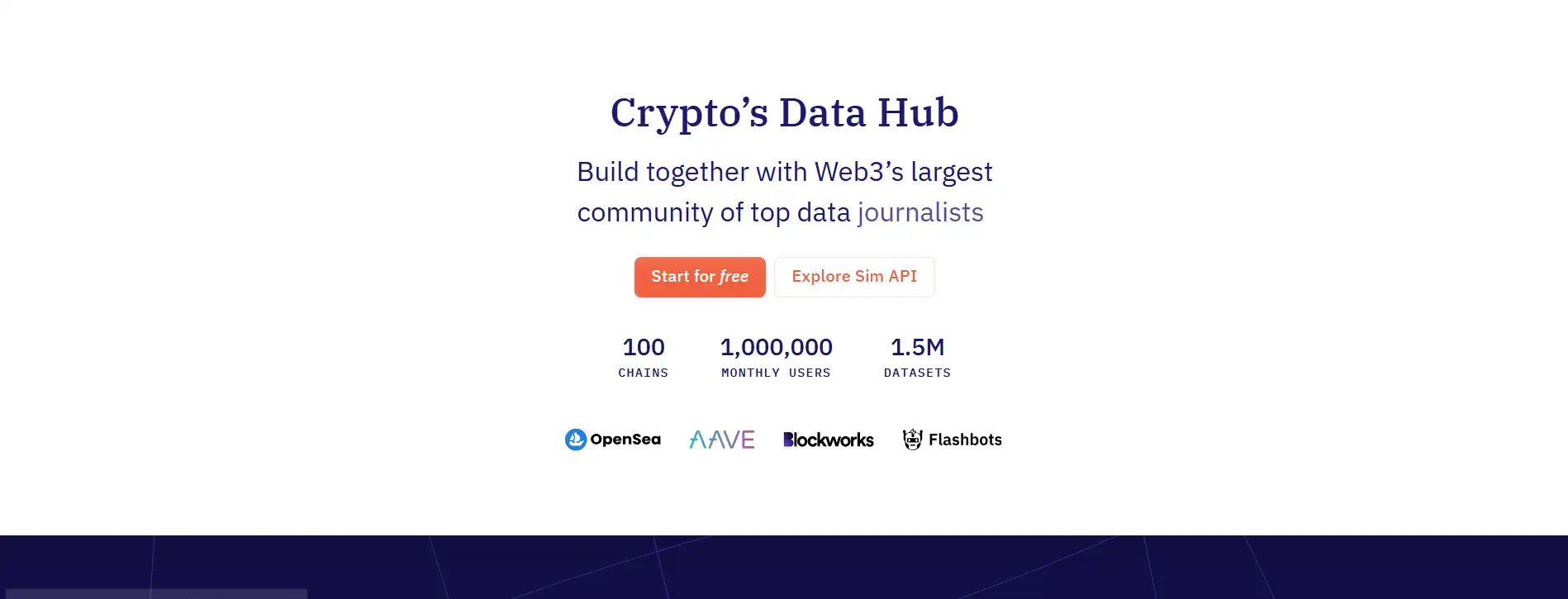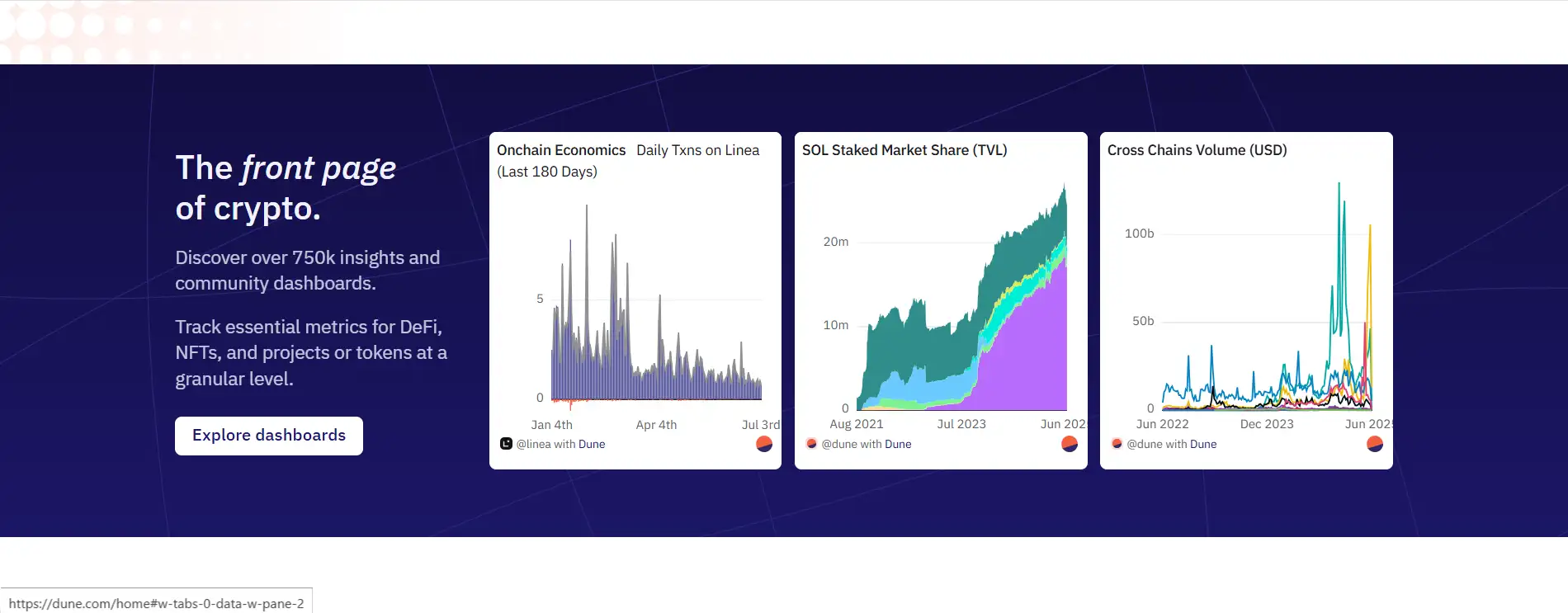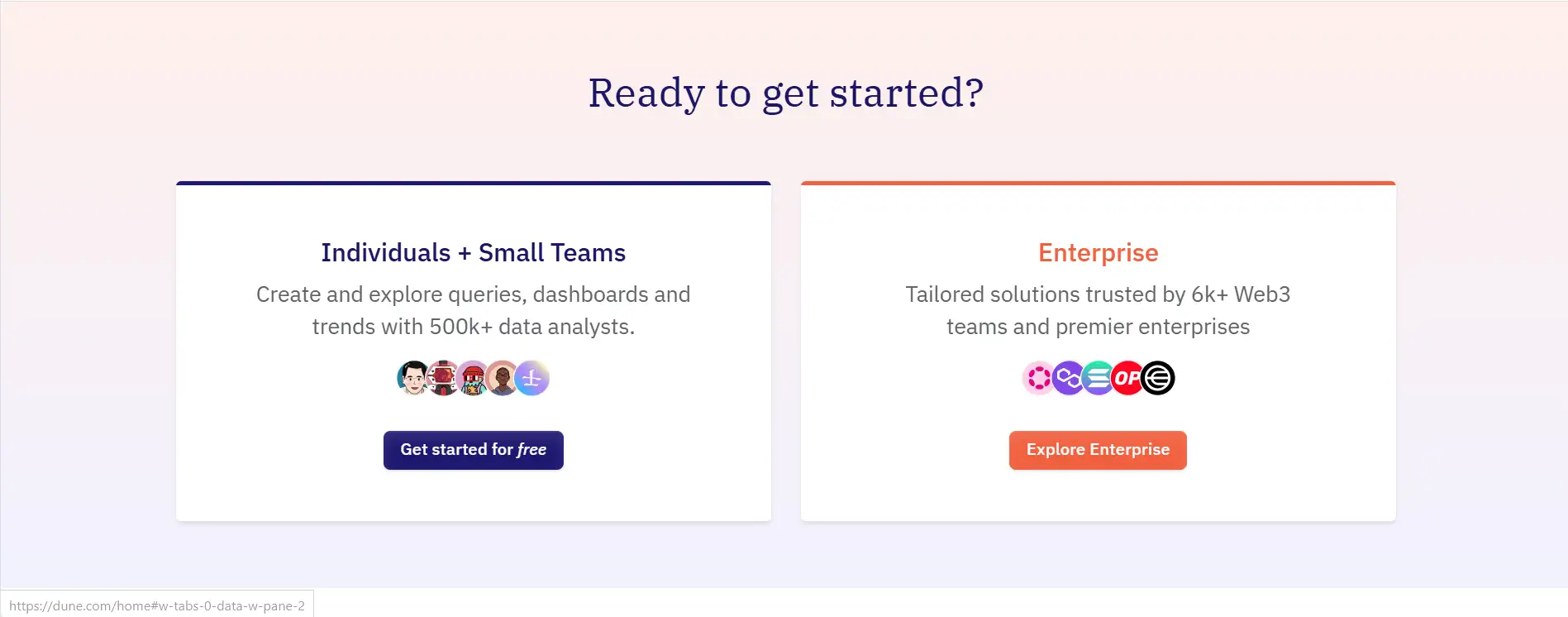About Dune Analytics
Dune Analytics is a leading Web3 data platform that empowers anyone to query, visualize, and share insights from public blockchain data. Known as the "front page of crypto," Dune allows users to track on-chain activity across more than 100 networks through powerful SQL-based querying and rich data visualizations. Whether you're a data analyst, DeFi project, or enterprise looking to harness real-time blockchain intelligence, Dune serves as your gateway to understanding the decentralized world through transparent data.
Since its inception in 2018, Dune has grown into a trusted home for multichain analytics, serving over 1 million monthly users and hosting over 750,000 dashboards. The platform supports everything from real-time app data via its Sim API to rich historical insights through Datashare, offering unmatched flexibility for individuals and enterprises alike. With a thriving community of over 500,000 data analysts, Dune is not only a tool—it’s a movement toward open, collaborative Web3 intelligence.
Dune Analytics was launched with a mission to make blockchain data accessible, interpretable, and shareable for everyone—from hobbyists to global enterprises. Blockchain ecosystems are inherently transparent, yet the structure of raw data can be overwhelming for the average user. Dune addresses this problem by offering a platform where users can write SQL queries against decoded smart contract data, visualize trends, and share dashboards with the broader community.
At its core, Dune operates as an open community hub for data exploration. With over 1.5 million datasets and support for more than 100 blockchains, it offers both breadth and depth in crypto analytics. Whether you're tracking TVL in DeFi protocols, analyzing NFT transaction volumes, or comparing activity across ecosystems, Dune provides the tools to do it all. Features like full historical archives, real-time APIs, and customizable dashboards ensure data is not only available—but actionable.
The ecosystem is structured around three main solutions: Sim for developers, Datashare for analysts, and Catalyst for chains. Sim offers fast access to multichain data for powering applications, Datashare allows teams to export or stream structured datasets, and Catalyst enables entire chains to integrate with Dune to enhance their ecosystem’s visibility. Combined, these tools make Dune the go-to analytics layer of the decentralized internet.
In terms of competition, Dune competes with tools like Nansen, Flipside Crypto, and Token Terminal. However, what sets Dune apart is its community-first approach—every query is public by default, encouraging transparency, collaboration, and reuse. This makes Dune not just a product, but a thriving knowledge-sharing ecosystem for Web3 data.
Dune Analytics provides numerous benefits and features that position it as a leader in the Web3 data analytics space:
- Multichain Data Coverage: Access data from over 100 blockchains, including Ethereum, Solana, BNB Chain, and more—all in one place.
- Community-Created Dashboards: Explore or fork from over 750,000 dashboards built by other analysts and researchers.
- Sim Developer API: Power your app with real-time blockchain data using Sim, Dune’s lightning-fast API platform for builders.
- Datashare for Professionals: Export or stream 1.5M+ datasets into your preferred environments like SQL engines, data lakes, or notebooks.
- Visualization Tools: Transform queries into rich visual charts and graphs with Dune’s native visualization builder.
- Public Querying: All queries are transparent and shareable by default, promoting community learning and reproducibility.
- Education & Tutorials: Learn how to use Dune through free tutorials, YouTube series, and the dedicated Dune University.
- Enterprise-Ready: Dune supports large teams and enterprises with premium dashboards, private workspaces, and data reliability guarantees.
Getting started with Dune Analytics is easy and flexible for analysts of all skill levels:
- Step 1 – Create an Account: Sign up at dune.com and choose between a free or enterprise tier.
- Step 2 – Learn the Basics: Explore the Dune University and official YouTube tutorials to understand how blockchain data is structured.
- Step 3 – Write a Query: Use the SQL-based Query Editor to pull data on tokens, smart contracts, NFTs, wallets, and more.
- Step 4 – Visualize the Results: Turn your query into charts, graphs, or tables using built-in visualization tools.
- Step 5 – Build a Dashboard: Create a new dashboard and add your visual widgets. Organize and present your insights in a clear layout.
- Step 6 – Share and Collaborate: Publish your dashboards, share with the community, and get feedback from other analysts in Dune’s Discord.
- Step 7 – Upgrade as Needed: If you're working in a team or need more powerful features, explore the Enterprise plan for enhanced capabilities.
Dune Analytics FAQ
While a block explorer shows you raw blockchain transactions one-by-one, Dune Analytics allows you to write custom SQL queries to aggregate, filter, and visualize this data in meaningful ways. Instead of browsing block by block, you can create dashboards that track user behavior, protocol usage, and token movement over time. With over 750,000 community dashboards and full access to historical and real-time data, Dune gives analysts superpowers beyond basic transaction views.
Sim is Dune’s multichain API layer that allows developers to integrate real-time blockchain data into their own apps or dApps. It supports over 60 chains and gives developers access to pre-decoded, indexed contract data with low latency. Whether you're building dashboards, alerting tools, or interactive experiences, the Sim API makes integrating analytics into your product seamless and scalable.
Yes—while SQL is the core querying language, Dune provides templates, community dashboards, and AI-assisted query tools to help non-technical users get started. You can fork existing dashboards or use query suggestions based on your input. The platform also includes guided tutorials and a beginner-friendly learning track in Dune University for those unfamiliar with SQL or blockchain structures.
Dune’s Datashare feature allows you to export or stream large datasets directly into your preferred tools, whether that’s a Jupyter Notebook, Snowflake, or data lake. This is especially useful for researchers, enterprises, and data scientists who need to work with data at scale. The Datashare solution enables external integrations without sacrificing data fidelity or real-time access.
Dune fosters a transparent and collaborative culture by making all queries public. This allows users to learn from each other, improve query techniques, and create reusable data insights. By encouraging open access, Dune strengthens the overall ecosystem and accelerates knowledge sharing within the Web3 data analyst community.
You Might Also Like












